One Night In Miami: Muhammad Ali and Jim Brown meeting with Malcolm X depicted in new film
- Published
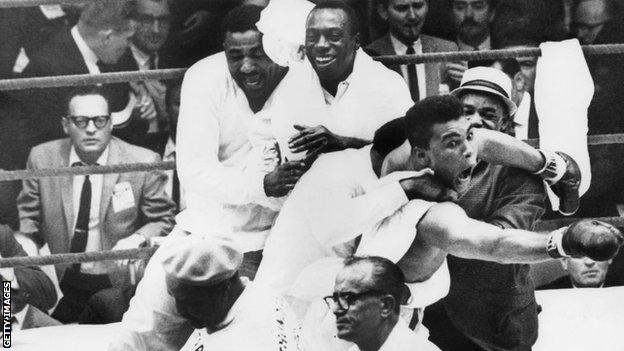
After beating Liston, Ali said he had 'shook up the world' and invited Sam Cooke to join his post-fight interview
When Muhammad Ali, then known as Cassius Clay, pulled off one of the greatest upsets in sporting history by beating Sonny Liston, there were three American icons ringside to witness it.
Like Ali, civil rights activist Malcolm X, singer Sam Cooke and NFL player Jim Brown were fearless, charismatic black men who used their platform to fight for racial equality in the United States.
It was rare that the four friends met together, but that night - 25 February 1964 - they agreed to hang out.
It was also the height of the civil rights movement, and it proved to be a meeting that changed their lives and the course of American history.
Ali and Brown were set to make headlines in and out of the sporting arena, and within a year, Malcolm and Cooke had been murdered.
I was like 'wow, to be a fly on that wall'
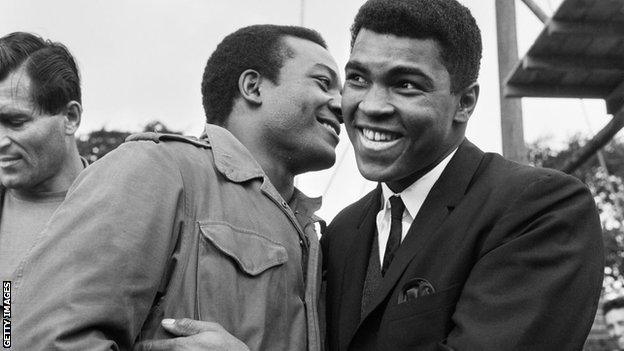
Ali visits Brown on the set of The Dirty Dozen in Hertfordshire, where Brown announced his retirement from sport in 1966
At a time when athletes were supposed to be just athletes, Ali and Brown blazed a trail for black sporting activism.
Brown, voted American football's fourth best player of all time, external in 2019, founded organisations to empower the black community and, in 1964, was contemplating a movie career.
Malcolm X was an outspoken Nation of Islam minister and Ali's spiritual mentor, while Cooke was a singer-songwriter and entrepreneur who had just recorded 'A Change Is Gonna Come', his most politically-charged song yet.
After watching Ali become world heavyweight champion for the first time,, external they all went back to Malcolm's room at the Hampton House motel, one of the few hotels in Miami that would accommodate black people.
For decades the significance of the meeting was overlooked but when former journalist Kemp Powers heard it took place he said "it blew my mind". It inspired him to write the play One Night in Miami, which he's now adapted for a film of the same name.
"It was like discovering the black Avengers," he told BBC Sport. "That night was a crucible moment for them. I was like 'wow, to be a fly on that wall'.
"People weren't really aware these guys were hanging out because, at the time, what they were doing put them all in danger."
The meeting
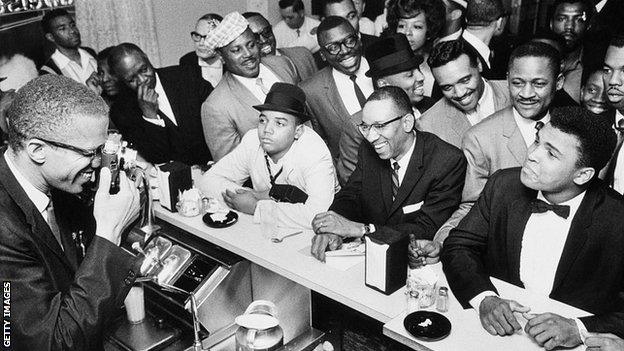
Malcolm X (left) takes a picture of Muhammad Ali (right) that night in the Hampton House cafe
Malcolm's activities were being monitored by the FBI and in early 1964 he had been suspended from speaking publicly for the Nation of Islam.
He visited Ali in Miami and, because of his presence, reporters were asking if Ali was part of the Black Muslim movement.
The eldest of his four friends at 38, Malcolm saw the power and potential that Ali, Brown and Cooke had to help 'the cause'.
They might have arrived at Malcolm's room hoping for an afterparty. Instead they had a philosophical, cultural debate over ice cream and soda.
"We talked about standing up as human beings and demanding our rights," Brown told a 2019 documentary, The Two Killings of Sam Cooke., external
"Being outspoken, the risk was to lose money, or your popularity with middle America. But those of us who were there that night cared nothing about that."
One Night in Miami imagines how the conversation played out. The lives of Ali and Malcolm, in particular, have been dramatised many times before, but Regina King's directorial debut shows these legends in a different light. It suggests what they were like as men, how they interacted as 'brothers'.
Powers also wanted to show that the man who declared "I am the greatest" had doubts - not just about the Liston fight, but the announcement he was about to make.
What happened next?
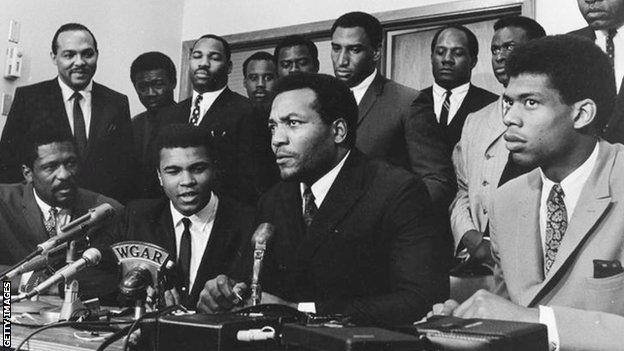
Basketball players Bill Russell (left) and Kareem Abdul-Jabbar (right) joined Ali and Brown to support the boxer's choice to be a conscientious objector
Brown and Cooke left Hampton House later that night - perhaps finding an afterparty after all - but what is known is that Ali and Malcolm went downstairs to celebrate in the motel's cafe.
The very next morning, the new world champion confirmed he was joining the Nation of Islam and changing his name to Cassius X, telling reporters: "I don't have to be what you want me to be."
Nine days later, he said he was, in fact, changing his name to Muhammad Ali as Cassius Clay is a slave name.
Two days after that, Malcolm X split from the Nation before going on a pilgrimage to Mecca, while Ali made the first of many trips to Africa.
But that December, Cooke was shot dead in a Los Angeles motel, and two months later Malcolm was assassinated by men affiliated to the Nation.
'A Change is Gonna Come' and Malcolm's autobiography were released posthumously so neither Cooke nor Malcolm saw the impact they'd have.
On this day: Rumble in the Jungle
Ali and Brown continued to do what they felt was right. In 1966, after being named the NFL's Most Valuable Player for a third time, Brown retired from American football at 29.
The Cleveland Browns star went on to appear in dozens of films and in 1967 he rallied together a group of prominent black athletes, who took the unprecedented step of stating their support of Ali's refusal to be drafted for the Vietnam War because of his religious beliefs.
Ali was convicted of draft evasion and stripped of his boxing licence. Although originally handed a five-year prison sentence, he remained free while he appealed until the decision was overturned in 1971.
The conviction cost him his world title and almost four prime years of his boxing career, but he returned to claim historic victories over George Foreman and Joe Frazier, becoming one of the world's greatest ever sportsmen. He died in 2016, at the age of 74.
"He had an indomitable spirit and relentlessness in whatever challenges he faced," said Eli Goree, who plays Ali in One Night in Miami.
"When the government came against him he stood his ground and maintained his principles. Eventually a popular war became unpopular and he was on the right side of politics."
The legacy
Amazon's release of One Night in Miami comes at a time when athletes are more empowered to be politically active than in the 1960s, but incidents of racial injustice in recent years show that more change is necessary.
"Every time the play is run, there is something happening that makes it seem timely, and it's the same now," said Powers.
"The first production of the play happened during the Trayvon Martin situation. When it ran in Baltimore people thought it was a reaction to the Freddie Gray situation. It's just that, unfortunately, we don't seem to be learning any lessons."
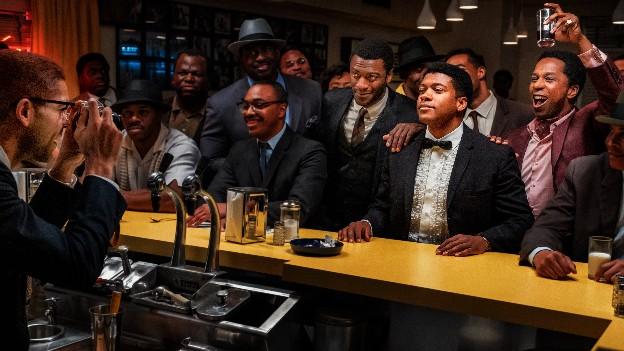
Eli Goree as Ali (second right) and Aldis Hodge as Brown (third right) in One Night in Miami
Hampton House is now a cultural centre while Brown, 84, remains a respected voice for the black community. In 2018, he and Kanye West spoke with Donald Trump in the Oval Office.
While Brown, Ali, Cooke and Malcolm X had different religious and political views, they respected each other's opinion and the role that each of them played in fighting for the same goal.
And Aldis Hodge, who plays Brown in One Night in Miami, feels that spirit is just as important 57 years on.
"I feel the film helps create the changes we need," he said. "It's about understanding where you stand on the issue and how you come together, regardless of your differences, to find the right solution.
"It calls out the necessity to do a little self-reflection and figure out if you're really meeting your potential to help your people."

Remembering an icon: Hear how David Bowie always managed to stay ahead of his time
Need a lift?: Joe Wicks and guests are here to bring positivity to your day
